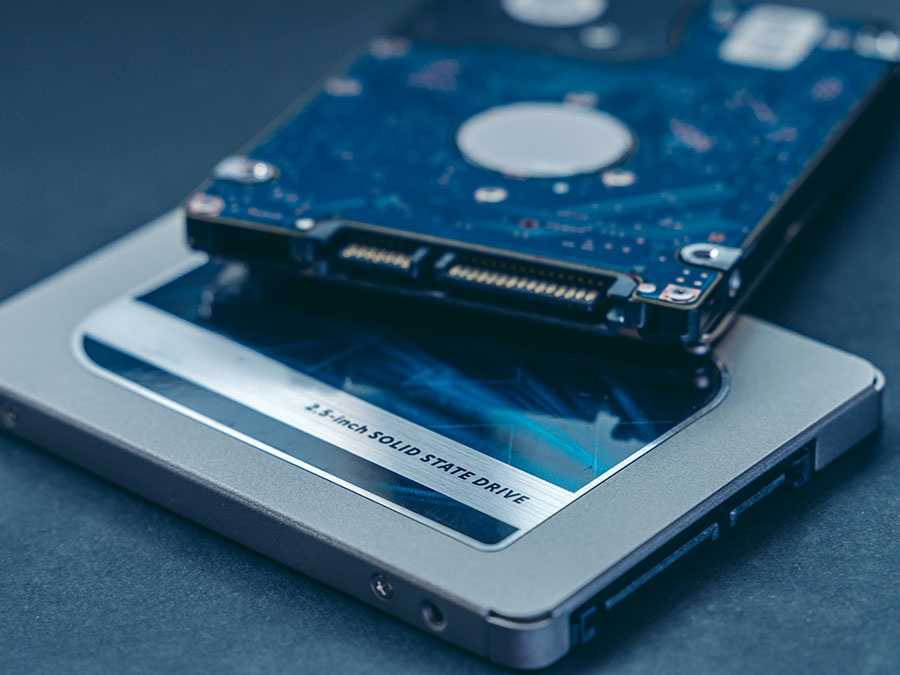Solid State Drives (SSDs) are a newer form of storage device used in computers and are slowly replacing the majority of traditional Hard Disk Drives (HDDs).
SSDs deliver superior performance and durability by using flash-based memory, making them significantly faster and upping your computer’s speed by a noticeable amount.
Implementation of SSDs across your business network can increase productivity and improve staff satisfaction. For the amount of storage space required for most business desktops and laptops, the cost of an SSD is very comparable to a traditional HDD. Furthermore, the small investment in an SSD may increase the speed of your existing equipment enough to warrant prolonging its useable life.
We’ve put together all you need to know about SSDs and why you might consider investing in this technology for your business.
How Does a Solid State Drive Work?
In contrast with traditional HDDs, Solid State Drives have no moving parts. Without these parts, SSDs are more durable, produce less heat and use less energy. They’re also more resistant to common drops and wear and tear because they lack the small parts which are susceptible to damage.
The vast majority of SSDs use NAND technology. This type of flash memory stores your files on grids, each individual grid storing between 256KB and 4MB and granting your PC access to your files almost instantly.
Essentially, SSDs are similar to the RAM in your computer except they do not lose information when you turn the power off. This allows them to work much more quickly and have greater reliability than a standard hard drive.
Advantages of SSDs
- Start up times average 5 – 20 times faster, which can increase productivity
- More responsive computer, ideal for laptops and PCs that are beginning to run slowly
- Opening programmes and files is almost immediate
- More robust which is great for laptops that are generally more susceptible to wear and tear
- Battery life of your laptop will increase
- Your computer will use less power making it more eco-friendly
- Less heat generated
- Almost silent – no more whirring noises
SSDs are particularly useful for companies working with large amounts of data, as fast access times and file-transfer speeds are crucial.
Are There Any Disadvantages of SSDs?
The cost of enterprise level storage (that found in servers) has always been high and for the equivalent SSD technology the cost is somewhat higher again.
For personal storage, the cost of SSDs becomes more significant with increasing storage capacity. If large amounts of data need to be archived, then traditional HDDs may be a better option but for everything else SSDs are generally the best option.
SSD vs HDD Comparison Table
|
Topic |
SSD |
HDD |
|
Durability |
No moving parts means SSDs are less likely to become damaged. | The intricate moving parts inside of an HDD can cause them to be susceptible to accidental damage and overheating. |
|
Reliability |
SSDs use flash memory to store data which is more reliable. | The moving parts inside an HDD are susceptible to wear and tear. The more use they get, the faster they will run down. |
|
Speed |
SSDs offer almost instant-load performance meaning faster boot times, faster loading times and better system responsiveness. | HDDs are hampered by the physical movement of the spinning platters and take longer to spin up. |
|
Capacity |
Larger capacity SSDs can be harder to find and significantly increase in price the larger they get. | High capacity HDDs are readily available and much cheaper than SSDs |
|
Price |
SSDs are more expensive per MB than an HHDs, especially or higher storage capacities. | HDDs are considerably cheaper than SDDs, especially larger drives over 1TB. |
|
Size |
SSDs are available in 2.5”, 1.8” and 1.0”, increasing the available space inside the computer. | Typical HDDs are usually 3.5” and 2.5” with no options for anything smaller. |
|
Noise |
SSDs do not generate noise due to them not having any moving parts. | With the moving parts inside of HDDS, they can produce loud whirring noises. |
Have Questions About SSDs?
As a leading business IT support company, we are very experienced in assessing whether new technology will be the best option for your business and can support with selecting the most appropriate hardware based on your requirements and budgets.
To ensure you do not lose any of your information, we carry out a fixed fee transfer of data from HDDs to SSDs, this also means you don’t need to reload your old computer. By security wiping your old drive and recycling it we ensure your data is safe and your business remains compliant with WEEE regulations.
Our aim is to find the right solution for every business we work with so they can see the long-term benefit of investing in the right IT equipment and IT support.
To discuss the potential benefits of SSD technology for your business, give us a call on 0117 975 9523 or schedule a no-obligation consultation with one of our expert team.

